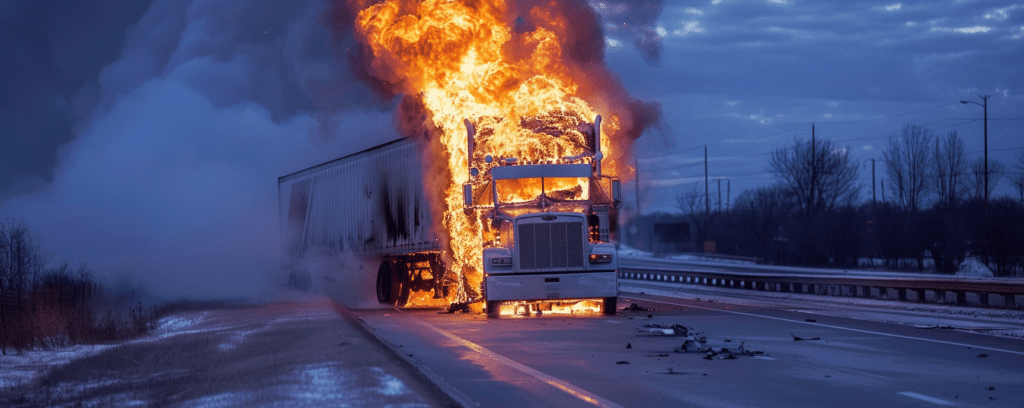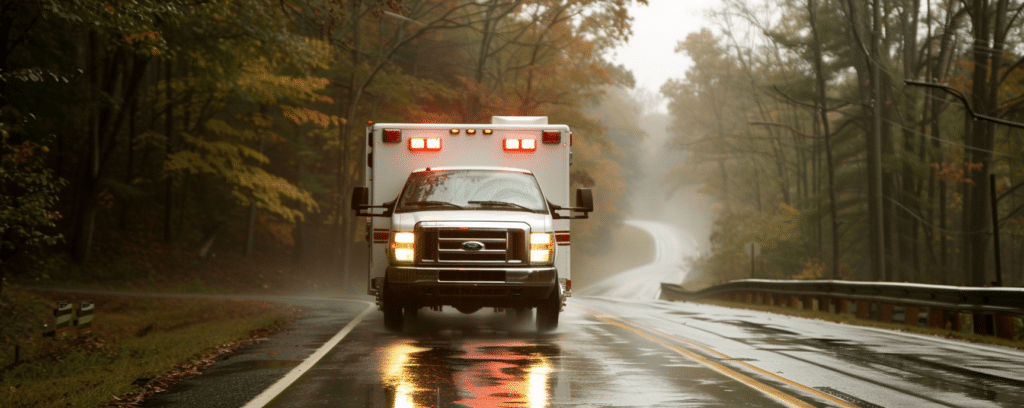The Worst Truck Accident in History: A Deep Dive into Tragedy and Safety Lessons
Last updated Wednesday, September 18th, 2024

When discussing the worst truck accident in history, one tragic event comes to mind. In this article, we delve into the catastrophic collision near Whitefish, Montana, in 1984, explore other major truck accidents, analyze their causes, and discuss lessons learned for improving road safety.
Key Takeaways
- Historical truck accidents, like those in Whitefish, Montana (1984) and Houston, Texas (1976), highlight the catastrophic consequences of vehicle collisions involving hazardous materials and large trucks.
- Common causes of truck accidents include human error, mechanical failures, adverse weather conditions, and driver fatigue, all of which underscore the need for stringent safety measures and regulations.
- Legal aspects of truck accidents involve determining liability, pursuing compensation, and the critical role of experienced truck accident lawyers in navigating complex legal scenarios for victims.
Defining the Worst Truck Accident
The term ‘worst truck accident’ evokes images of crumpled vehicles and emergency crews, yet defining it is a complex task. With factors like fatalities, serious injuries, and the extent of destruction in play, the worst truck accidents often reflect a convergence of human error, mechanical failures, and the unforgiving forces of nature. These incidents, from a fatal accident that occurred under clear skies to a double tanker truck sideswiped amidst a storm, remind us that the mass and momentum of a semi-truck can turn any mishap into a serious trucking accident case.
As we consider the worst multiple-vehicle accidents, let’s remember the lives altered by these catastrophic events and the imperative to understand and prevent them.
Notable Historical Truck Accidents
Moving through the annals of transportation history, we encounter truck accidents, including trucking accidents, that have left indelible marks on communities and shaped our approach to road safety. From the fiery collision of a fuel tanker truck with a school bus in the chilling Montana winter to the toxic cloud unleashed by a tanker in Houston, these tragic truck accidents serve as stark reminders of the vulnerabilities of vehicles involved in high-speed travel.
As we revisit these historic crashes, we glean lessons from the past to safeguard our future on the roads.
Whitefish, Montana 1984
In the pages of Montana history happened one of the most heart-wrenching tragedies on January 21, 1984. A school bus carrying a high school wrestling team collided with a jackknifed fuel tanker on U.S. 2 near Whitefish, Montana. The resultant explosion and fire claimed nine lives and left 19 others with serious injuries.
This accident, the worst in Montana’s history, occurred as the bus was returning from a match—a grim reminder that a moment’s misfortune on the road can lead to a lifetime of sorrow.
Houston, Texas 1976
On the Houston freeway, a speeding tanker truck met its fate in 1976, resulting in a catastrophe of epic proportions. The truck, failing to navigate a turn, crashed through a guardrail and released a poisonous anhydrous ammonia cloud that enveloped the unsuspecting motorists. The toxic mist claimed five lives and inflicted injuries on 178 people.
This tragic event not only caused immediate harm but also raised serious concerns about the transportation of hazardous materials through densely populated areas.
Los Angeles, California 2002
A foggy day on November 3, 2002, set the stage for chaos on Interstate 10 south of Los Angeles. Visibility was near zero when a semi-truck crash triggered a catastrophic chain reaction, ultimately involving 216 vehicles. While miraculously no lives were lost, the crash resulted in 41 injuries and a stark warning about the risks of driving in adverse weather conditions.
It was a stark reminder that even in the absence of fatalities, the physical and psychological toll of such accidents can be immense.
Major Pile-Ups Involving Trucks
As we navigate the complexities of road travel, the phenomenon of major pile-ups looms as a formidable threat, particularly when trucks are involved. These harrowing events, such as the icy calamity in Fort Worth and the fog-engulfed disaster in Mobile, underscore the unpredictable and often treacherous nature of our highways.
The tales of these pile-ups, where a single moment can lead to a cascade of destruction, are not just stories of survival and loss but also powerful calls for increased vigilance and improved safety measures.
Fort Worth, Texas 2021
February 2021 in Fort Worth, Texas, presented a grim tableau as icy roads became the stage for a 133-vehicle pile-up. The treacherous conditions, compounded by high-speed driving, led to the tragic loss of six lives and inflicted multiple injuries on the survivors.
The spectacle of crumpled cars and overturned trucks served as a painful reminder of nature’s might and the fragility of human life when pitted against the elements and the momentum of heavy vehicles.
Mobile, Alabama 1995
In 1995, a dense fog descended over Mobile Bay, Alabama, setting the stage for one of the worst pile-ups in history. On Interstate 10, 200 vehicles collided in a blind dance of metal and glass. The disaster claimed one life and caused injuries to 90 people, a stark testament to the chaos that can ensue when visibility dwindles to nothing, and the roads become treacherous pathways to peril.
Galesburg, Michigan 2015
The year 2015 witnessed a chilling scene in Galesburg, Michigan, as 193 vehicles, including a truck carrying fireworks and acid, became entangled in an explosive pile-up. The hazardous materials added a terrifying dimension to the crash, which resulted in one death and 23 injuries.
This tragedy serves as a harsh reminder of the potential dangers that lurk in the cargo holds of the trucks that share our roads and the catastrophic consequences that can follow when they are involved in most tragic truck accidents, including cases where a truck accident killed innocent people.
Common Causes of Catastrophic Truck Accidents
Peering into the causes of truck accidents, we find a tapestry of factors that contribute to these incidents. Some common causes include:
- Human error
- Aggressive driving
- Mechanical malfunctions
- Speeding tankers losing control
- Cargo shifting unpredictably
These elements, often exacerbated by the sheer size and weight of trucks, conflate to create scenarios where catastrophic outcomes are all but guaranteed. Understanding these common causes is pivotal in our pursuit of prevention and the quest for safer roads for all.
Adverse Weather Conditions
Adverse weather conditions are often invisible assailants on the road, turning routine journeys into potential disasters. Fog, ice, and rain transform highways into treacherous gauntlets that challenge even the most experienced truck drivers. Incidents, where thick fog led to massive pile-ups or where a slight sleet turned roads into slippery death traps, underscore the critical importance of respecting nature’s volatility while navigating our highways.
Driver Fatigue
Driver fatigue stands as a silent predator on the road, stealthily undermining the alertness and reaction times of truck drivers. The relentless push to meet deadlines and the temptation to flout hours-of-service regulations can lead to disastrous consequences.
Fatigued drivers, especially those who operate heavy vehicles, are ticking time bombs on the road, and the implementation of stricter rest mandates is a crucial step in defusing this pervasive risk.
Mechanical Failures
Mechanical failures, such as brake malfunctions and tire blowouts, are formidable catalysts for truck accidents. The failure to adhere to regular maintenance schedules or to conduct thorough inspections can have dire consequences.
Properly maintained vehicles and well-trained drivers are the bulwarks against such mishaps, ensuring that a mechanical hiccup does not escalate into a full-blown roadside tragedy.
Legal Aspects of Truck Accidents
The wreckage of a truck accident often extends beyond the physical debris, giving rise to complex legal battles where determining liability and pursuing compensation become labyrinthine endeavors. Navigating these legal intricacies requires a deft hand, as multiple parties from truck drivers to cargo loaders may bear responsibility.
An experienced personal injury attorney experienced in trucking accidents can be the guiding light through this legal morass, ensuring victims receive the restitution they deserve.
Determining Liability
In the aftermath of a truck accident, determining liability is akin to unraveling a knotted thread, with potential culpability extending to drivers, trucking companies, and even cargo loaders. The investigation delves into driver logs, vehicle inspection records, and the electronic footprints left by mandatory logging devices. Amidst this complexity, recent regulatory changes, such as the FMCSA’s Drug and Alcohol Clearinghouse, are reshaping the landscape of accountability.
Pursuing Compensation
For victims of truck accidents, the journey to fair compensation is fraught with challenges. Legal representation becomes a beacon of hope, guiding them through the process of evidence collection and litigation. With the potential need to sue multiple parties, the pursuit of compensation is a battle for justice, fought on the grounds of lost wages, medical bills, and the intangible suffering endured.
Role of a Truck Accident Lawyer
The role of a truck accident lawyer transcends that of a mere legal advisor; they become the architect of a case, employing experts and reconstructing the scene to establish the truth.
Skilled in the art of negotiation, these attorneys are the champions of their client’s rights, ensuring that the scales of justice tip in favor of those wronged by the tragedy of truck accidents.
Safety Measures and Prevention
As we contemplate the wreckage left in the wake of truck accidents, it is paramount to shift our focus to the horizon of prevention. Safety measures such as maintaining distance, passing with care, and avoiding blind spots are tangible actions that drivers can take to mitigate risks. Beyond driver behavior, advancements in technology, regulatory oversight, and training initiatives offer a blueprint for a future where the road is a safer place for everyone.
Advanced Technology
Advanced technology is the vanguard of accident prevention, with innovations such as collision avoidance systems and automatic emergency braking acting as digital sentinels on the road. These technologies extend the senses of truck drivers, providing crucial warnings and interventions that can avert the dire consequences of a potential crash.
As these systems become more sophisticated, they promise to be instrumental in reducing the frequency and severity of truck accidents.
Regulatory Improvements
Regulatory improvements are pivotal in steering the trucking industry towards increased safety. Proposals for speed-limiting devices and the installation of environmental sensors represent proactive strides in reducing the risks of pile-ups. However, the rollback of certain safety laws serves as a cautionary tale, reminding us that regulatory vigilance is essential to maintaining and enhancing the safeguards that protect motorists on our roads.
Training and Awareness
Training and awareness are the twin pillars of accident prevention in the trucking industry. By equipping drivers with defensive driving techniques and raising public consciousness about the dangers of distracted driving, we lay the groundwork for safer interactions between trucks and passenger vehicles.
These educational efforts, when combined with the adoption of collision avoidance systems, form a comprehensive safety strategy that can significantly reduce traffic accidents.
Frequently Asked Questions
What are some common causes of truck accidents?
Common causes of truck accidents include human error, adverse weather conditions, driver fatigue, and mechanical failures, as well as issues like aggressive driving, speeding, improperly loaded cargo, and lack of vehicle maintenance. All of these factors can contribute to catastrophic events on the road.
How can technology help prevent truck accidents?
Technology can help prevent truck accidents by providing features such as collision avoidance systems, forward-collision warning systems, and automatic emergency braking, which can detect hazards and assist drivers in avoiding collisions.
Who can be held liable in the event of a truck accident?
In the event of a truck accident, liability may involve the truck driver, trucking company, vehicle maintenance provider, cargo loading companies, and manufacturers, and a thorough investigation is typically needed to determine liability.
What is the role of a truck accident lawyer?
A truck accident lawyer helps victims by navigating the legal process, gathering evidence, retaining experts, and negotiating with insurance companies to secure fair compensation. They also represent the victim’s interests in settlement negotiations or court.
What safety measures can drivers take to avoid truck accidents?
To avoid truck accidents, drivers should maintain a safe distance from trucks, pass them safely, avoid blind spots, adhere to speed limits, be aware of weather conditions, and drive attentively. These measures are crucial for preventing accidents.













